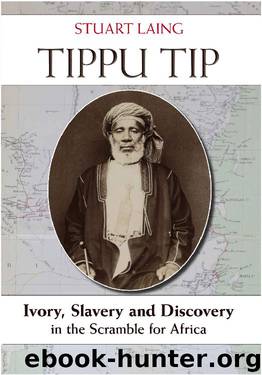Tippu Tip: Ivory, Slavery and Discovery in the Scramble for Africa by Stuart Laing

Author:Stuart Laing [Laing, Stuart]
Language: eng
Format: epub
Publisher: Medina Publishing
Published: 2017-10-17T05:00:00+00:00
“Tippu Tip’s grand canoes going down the Congo”: a typical scene of traditional traffic on the great river, as depicted in The Illustrated London News of 21 December 1889.
It was Christmas Day 1876. They celebrated by holding games, including canoe races, running races, and – “the great event” – a 300-yard race between Tippu Tip and Frank Pocock, in which “the sinews of the muscular Arab carried him to the front at the finish by 15 yards”. The prize was a “richly chased silver goblet and cup”, a present Stanley had been given before leaving England; we wonder why it had been in his baggage for these thousands of miles! Somehow they persuaded ten young women also to compete for a prize on the same race-course (the village high street), which Stanley relates “convulsed the hundred assembled to witness the unusual scene”. To return the hospitality, Tippu Tip gave the whole company a feast the next day, with rice, roast sheep, and palm-wine. Stanley is at pains to play up the good spirits of all on the expedition – both those going on downriver, and those going back.13
By dint of stealing more canoes, Stanley was able to make his entire party water-borne, and he set off with 143 people (including 24 women and children) in Lady Alice and 22 canoes. He claims to have paid Tippu Tip a bank draft for MT$2,600, and various goods including a donkey, brass wire, cloth, beads, cowries and ammunition. But the amounts Stanley actually paid, and the promises he made, are open to question, and became later a source of enmity between the two men which was to end in the courts in Zanzibar.
At this point in the Maisha, in which he has gone into unusual detail in recounting what the mutinous men had said to him, and his replies, Tippu Tip makes no mention of receiving any money or gifts. He quotes Stanley:
“I don’t know how to pay you back, to recompense you for your kindness, nor how much to give you. But when I get back to Europe I shall receive esteem and much wealth. I’ll bring you back a watch worth 1,000 dollars, mounted with diamonds, and as for money I’ll bring you a countless sum …”14
Years later he told Brode that he had received a draft for money, but had not been told the amount; and that, when he presented it to the Indian merchant and banker Taria Topan on his return to Zanzibar, he had been astonished that it was for between MT$2,000 and MT$3,000, not the MT$7,000 he had expected. He admitted to receiving the donkey; in fact he told Brode there were two, since Stanley had four but could transport only two in the river boats. He did not consider the cloth a gift: this was payment for the food for the men, which was part of the contract.15
He did consider that Stanley owed him moral, if not financial, debt, as he explained to the Belgian Jérôme Becker in Tabora in 1882:
In this critical situation, I came to his aid.
Download
This site does not store any files on its server. We only index and link to content provided by other sites. Please contact the content providers to delete copyright contents if any and email us, we'll remove relevant links or contents immediately.
| African-American & Black | Australian |
| Chinese | Hispanic & Latino |
| Irish | Japanese |
| Jewish | Native American & Aboriginal |
| Scandinavian |
Becoming by Michelle Obama(10004)
Beartown by Fredrik Backman(5718)
The Last Black Unicorn by Tiffany Haddish(5617)
Man's Search for Meaning by Viktor Frankl(4556)
The Book of Joy by Dalai Lama(3961)
The Five People You Meet in Heaven by Mitch Albom(3547)
In a Sunburned Country by Bill Bryson(3524)
The Choice by Edith Eva Eger(3464)
Full Circle by Michael Palin(3432)
The Mamba Mentality by Kobe Bryant(3249)
The Social Psychology of Inequality by Unknown(3009)
Imagine Me by Tahereh Mafi(2926)
Book of Life by Deborah Harkness(2913)
The Checklist Manifesto by Atul Gawande(2831)
Less by Andrew Sean Greer(2681)
A Burst of Light by Audre Lorde(2582)
The Big Twitch by Sean Dooley(2421)
No Room for Small Dreams by Shimon Peres(2355)
No Ashes in the Fire by Darnell L Moore(2326)
